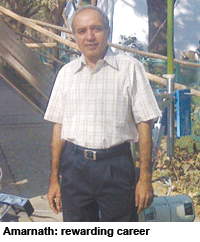The scope and possibilities of the emerging science of robotics are vast, spanning space exploration, surgery, automotive industry and the defence services
With blockbuster movies Robot and Ra-One having fired the imagination of Indian youth already hooked on computer games in a big way, robotics is emerging as a glamorous and popular career option.
The science of robotics is centred around the development and application of sophisticated robots and comput-erised systems for manufacturing, sensory feedback and information processing. More simply, robotics is about designing and maintaining robots, developing new applications for them, and conducting research to expand the boundaries of robotics science. Robots may be remote-controlled by operators or possess artificial intelligence. The Robotics Institute of America describes a robot as a “reprogrammable multi-functional manipulator designed to move materials, parts, tools or specialised devices through variable programmed motions for the performance of a variety of tasks”.
The scope and possibilities of the emerging science of robotics are vast, spanning space exploration, surgery, automotive industry and the defence services. In Japan and Korea, most industries are heavily automated with robots rapidly replacing the depleting labour force. In the US, this new science is being driven by the military-industry complex while in India, robotics technology is growing fastest in the healthcare industry.
High degrees of specialisation are required to make a career in robotics. Hence there are not too many options in undergraduate education, although it is a popular elective course for engineering students at all IITs and several NITs (National Institutes of Technology). Over the years, specialised study programmes in robotics — in mechanical engineering the tilt is towards manipulators and mobile robots; in electrical engineering towards control; and in computer science towards artificial intelligence and digital control — have become popular. A combination of mechanical engineering, electronics and computer science is required for robotics studies.
With sensors becoming important and forming the basis for autonomous and smart devices, several university departments, especially of physics and chemistry, have introduced courses on the science behind sensors. For those aiming for Masters and doctoral degrees, academic and industrial research in robotics is fertile ground. In terms of robotics research in India, there are excellent labs and facilities at the Indian Institute of Science, Bangalore and most IITs. All these institutes offer postgraduate and doctoral degrees, summer fellowships and project-based employment opportunities for those with research aptitude. These labs are among the best worldwide in terms of research output, publications and patents.
Opportunities in India are still emerging and the focus is primarily on educational robotics. There are hardly any companies in the country designing and building industrial robots. The four main careers in this field are in R&D, manufacturing, applications develop-ment and teaching. Salaries are attractive depending on employer profile and applicants’ competence and experience. From Rs.5 lakh per annum, remuneration packages could zoom to over Rs.50 lakh plus attractive perks at the CTO (chief technology officer) level.
 “Specialised robots are being built in the laboratories of BARC, DRDO and ISRO where R&D personnel are in great demand. The real job opportunities are in automation within robotics. There’s a huge need for introducing automation in every sector — industrial, agricultural, space and under-sea exploration — the list is endless and skilled professionals are required for the purpose,” opines Dr. C. Amarnath, chair professor of the mechanical engineering department of IIT-Bombay, who established the institute’s robotics lab in 1995 and also heads SINE (Society for Innovation and Entrepreneurship) of IIT-B. A mecha-nical engineering graduate and post-graduate of Annamalai and Allahabad universities with a doctorate in mechanism synthesis and design, Amarnath signed up with IIT-Bombay in 1976 as a faculty member.
“Specialised robots are being built in the laboratories of BARC, DRDO and ISRO where R&D personnel are in great demand. The real job opportunities are in automation within robotics. There’s a huge need for introducing automation in every sector — industrial, agricultural, space and under-sea exploration — the list is endless and skilled professionals are required for the purpose,” opines Dr. C. Amarnath, chair professor of the mechanical engineering department of IIT-Bombay, who established the institute’s robotics lab in 1995 and also heads SINE (Society for Innovation and Entrepreneurship) of IIT-B. A mecha-nical engineering graduate and post-graduate of Annamalai and Allahabad universities with a doctorate in mechanism synthesis and design, Amarnath signed up with IIT-Bombay in 1976 as a faculty member.
According to Amarnath, there’s a big vacuum in this field and hundreds of highly skilled engineers will be required for building the mechanical and electronic hardware, sensors, and for developing sophist-icated algorithms to design autonomous and intelligent systems. “Given the multi-disciplinary nature of robotics science, any science or engineering graduate can move into automation,” he adds.
President of the Association for Machines and Mechanisms, the national body affiliated with the International Federation of Mechanism and Machine Theory which he established, and organiser of several technology comp-etitions in the country, Amarnath recommends robotics as a rewarding and exciting career for young engineers. “The flying platform in the movie 3 Idiots was built by three IIT-B students who were into automation and devel-oped the capabilities of the flyer. With the rapid march of technology, the sky is the limit for those with passion for theory and laboratory work,” says Amarnath.
Indra Gidwani (Mumbai)